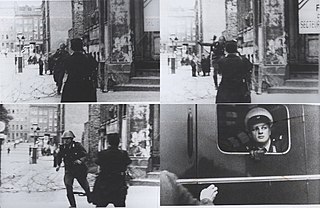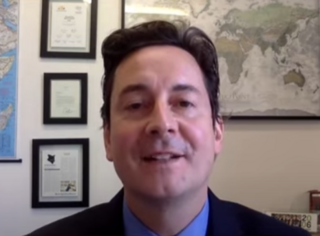The Office of the United Nations High Commissioner for Refugees (UNHCR) is a United Nations agency mandated to aid and protect refugees, forcibly displaced communities, and stateless people, and to assist in their voluntary repatriation, local integration or resettlement to a third country. It is headquartered in Geneva, Switzerland, with over 18,879 staff working in 138 countries as of 2020.

A refugee, conventionally speaking, is a person who has lost the protection of their country of origin and who cannot or is unwilling to return there due to well-founded fear of persecution. Such a person may be called an asylum seeker until granted refugee status by the contracting state or the United Nations High Commissioner for Refugees (UNHCR) if they formally make a claim for asylum.

The International Rescue Committee (IRC) is a global humanitarian aid, relief, and development nongovernmental organization. Founded in 1933 as the International Relief Association, at the request of Albert Einstein, and changing its name in 1942 after amalgamating with the similar Emergency Rescue Committee, the IRC provides emergency aid and long-term assistance to refugees and those displaced by war, persecution, or natural disaster. The IRC is currently working in about 40 countries and 26 U.S. cities where it resettles refugees and helps them become self-sufficient. It focuses mainly on health, education, economic wellbeing, power, and safety.

A refugee camp is a temporary settlement built to receive refugees and people in refugee-like situations. Refugee camps usually accommodate displaced people who have fled their home country, but camps are also made for internally displaced people. Usually, refugees seek asylum after they have escaped war in their home countries, but some camps also house environmental and economic migrants. Camps with over a hundred thousand people are common, but as of 2012, the average-sized camp housed around 11,400. They are usually built and run by a government, the United Nations, international organizations, or non-governmental organization. Unofficial refugee camps, such as Idomeni in Greece or the Calais jungle in France, are where refugees are largely left without the support of governments or international organizations.

Dadaab is a semi-arid town in Garissa County, Kenya. It is the site of a UNHCR base hosting 302,805 registered refugees and asylum seekers in three camps as of 31 October 2023, making it one of the largest in the world behind Kutupalong refugee camp. The centre is run by the United Nations High Commissioner for Refugees, and its operations are financed by foreign donors. In 2013, UNHCR, the governments of Kenya and Somalia signed a tripartite agreement facilitating the repatriation of Somali refugees at the complex.

Goma is the capital and largest city of the North Kivu Province in the eastern region of the Democratic Republic of the Congo (DRC). It is located on the northern shore of Lake Kivu, next to the Rwandan city of Gisenyi. It shares its borders with Bukumu Chiefdom to the north, Rwanda to the east, Masisi Territory to the west, and is flanked by Lake Kivu to the south. The city lies in the Albertine Rift, the western branch of the East African Rift System, and is only 13–18 km (8.1–11.2 mi) south of the active Nyiragongo Volcano. With an approximate area of 75.72 square kilometers, the city has an estimated population of nearly 2 million people according to the 2022 census, while the 1984 estimate placed the number at 80,000.

Afghan refugees are citizens of Afghanistan who were forced to flee from their country as a result the continuous wars that the country has suffered since the Afghan-Soviet war, the Afghan civil war, the Afghanistan war (2001–2021) or either political or religious persecution. The 1978 Saur Revolution, followed by the 1979 Soviet invasion, marked the first major wave of internal displacement and international migration to neighboring Iran and Pakistan; smaller numbers also went to India or to countries of the former Soviet Union. Between 1979 and 1992, more than 20% of Afghanistan's population fled the country as refugees. Following the Soviet withdrawal in 1989, many returned to Afghanistan, however many Afghans were again forced to flee during the civil war in the 90s. Over 6 million Afghan refugees were residing in Iran and Pakistan by 2000. Most refugees returned to Afghanistan following the 2001 United States invasion and overthrow of the Taliban regime. Between 2002 and 2012, 5.7 million refugees returned to Afghanistan, increasing the country's population by 25%.
Bruno Geddo is an Italian national, born in Novara in 1959. He has served with the United Nations High Commissioner for Refugees (UNHCR) for over 30 years in Sub-Saharan Africa, North Africa and the Middle East.
Congolese Americans are Americans descended from the peoples of the Democratic Republic of the Congo and the Republic of the Congo, which consist of hundreds of ethnic groups.
An urban refugee is a refugee who decided or was obliged to settle in an urban area rather than in a refugee camp in the country or territory where the person fled to. More than 60% of the world's refugee population and 80% of internally displaced persons (IDP) under UNHCR mandate live in urban environments. In 2009, their number was around 5.5 million people. "Urban refugee" is not a recognized legal term in the 1951 Convention relating to the Status of Refugees. However, the UNHCR has adopted a 'Policy on Refugee Protection and Solutions in Urban Areas' in 2009.
Sudanese refugees are persons originating from the country of Sudan, but seeking refuge outside the borders of their native country. In recent history, Sudan has been the stage for prolonged conflicts and civil wars, as well as environmental changes, namely desertification. These forces have resulted not only in violence and famine but also the forced migration of large numbers of the Sudanese population, both inside and outside the country's borders. Given the expansive geographic territory of Sudan, and the regional and ethnic tensions and conflicts, much of the forced migration in Sudan has been internal. Yet, these populations are not immune to similar issues that typically accompany refugeedom, including economic hardship and providing themselves and their families with sustenance and basic needs. With the creation of a South Sudanese state, questions surrounding southern Sudanese IDPs may become questions of South Sudanese refugees.
Africa Humanitarian Action (AHA) is a non-governmental organization that provides relief services to countries in Africa. It was founded by Dr. David Zawde in 1994 in response to the Rwandan genocide.

Sasha Chanoff is an American humanitarian based in Somerville, Massachusetts who has worked for two decades in refugee rescue, relief, and resettlement operations in Africa and the United States.
Third country resettlement or refugee resettlement is, according to the UNHCR, one of three durable solutions for refugees who fled their home country. Resettled refugees have the right to reside long-term or permanent in the country of resettlement and may also have the right to become citizens of that country.
South Sudanese refugees are persons originating from the African country of South Sudan, but seeking refuge outside the borders of their native country. The world's youngest independent country has a recent and troubled history of prolonged conflicts and ecosystem mismanagement such as overlogging, which has led to desertification. These forces have resulted not only in violence and famine, but also the forced migration of large numbers of the population, both inside and outside the country's borders. South Sudan was cited as the largest refugee crisis in 2016, being the world's third largest, followed by Syria and Afghanistan. As of 2022, the UNHCR estimated that there were 2.4 million refugees under its mandate originating from South Sudan, making the country the fifth largest source of refugees.

Nakivale refugee settlement is a settlement located in Isingiro District near the Tanzania border in Southwest Uganda.
Kyangwali Refugee Settlement is a refugee camp in the Kibuube District in western Uganda. As of 2023, Kyangwali is home to 136,032 people.

Alexander Betts is Professor of Forced Migration and International Affairs, William Golding Senior Fellow in Politics at Brasenose College, and Associate Head of the Social Sciences Division at the University of Oxford.
UniRef – University for Refugees – is a humanitarian non-governmental organization, specialized in delivering higher education for refugees, and headquartered in Geneva (Switzerland). In partnership with world-class universities and international humanitarian organizations, UniRef offers university courses to refugees and to people from the host community facing financial difficulties. In order to propose a training adapted to the specific living context of the community and in line with the demands from the local labor market, this NGO provides its own courses in cooperation with its partners.

Kalobeyei Refugee Settlement, also known as Kalobeyei Integrated Settlement, is a refugee camp located in Turkana County, Kenya. The settlement was established in 2015 to accommodate the growing number of South Sudanese refugees who fled their country due to the conflict that broke out in December 2013.









